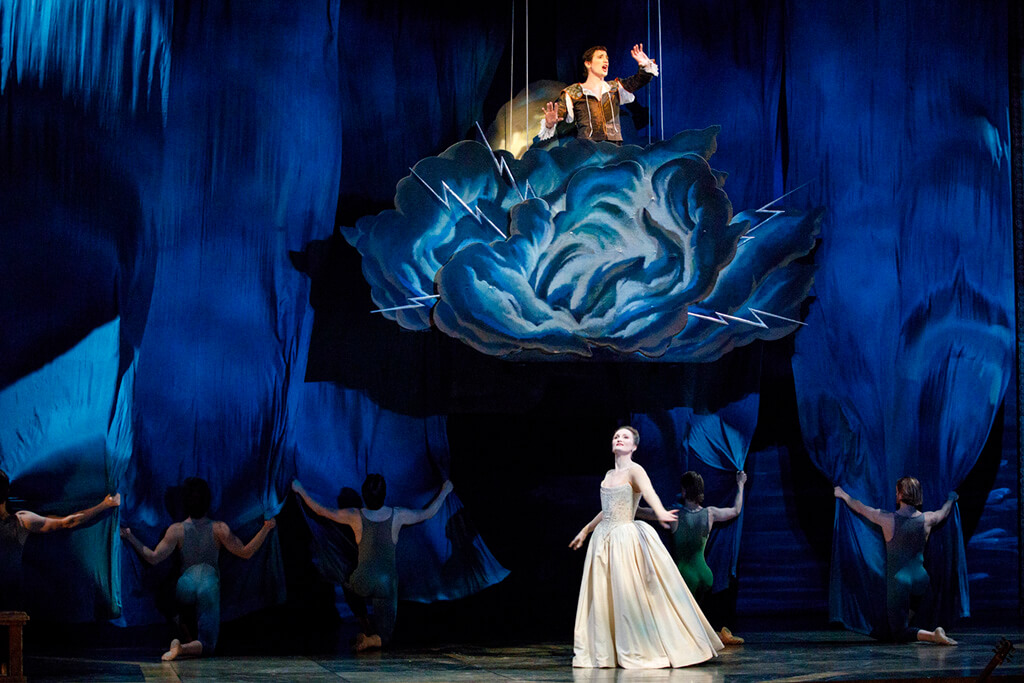
Monteverdi’s The Return of Ulysses: Opera Atelier. Directed by Marshall Pynkoski. Tafelmusik Orchestra conducted by David Fallis. Through Apr. 28 at the Elgin Theatre. operaatelier.com
Opera Atelier’s production of Il Ritorno di Ulisse in Patria (The Return of Ulysses to his Homeland) by the resurgent star of early music drama Claudio Monteverdi is easily one of the most dramatically unusual works that Opera Atelier has mounted in recent years. Certainly one of the most popular entertainments in the newly-minted public opera city of Venice, the work’s themes of virtue, fortune and godly intervention clearly appealed to Venetians at the dawn of the public opera house era.
Italians likely cared not a whit for the basis of the story or even its multiple adaptations and changes made to the epic by librettist Giacomo Badoaro and ultimately by Monteverdi himself. It is much, much more likely they wanted a story about virtue and fidelity (Penelope) in the face of cruel fate, and an equally steadfast, divinely-shipwrecked title character battling for a final time his supernatural enemy Neptune, who is still angered at the blinding of his son Cyclops by the arrogant Ulysses.
We hear nothing of Ulysses’ adventures from Monteverdi or even much of his epic story, his cunning character, let alone one reference in Act III to his semi-divine nature (he is the grandson of Mercury, the messenger god). Rather he is portrayed as a victim of the gods’ capricious, all-too-human bickering among themselves over Helen’s abduction by Paris of Troy, an über-conflict that enveloped much of the Mediterranean for a decade in what came to be called the Trojan War. Though the gods may have started it (see the Judgement of Paris), humans decidedly were left to finish the dirty job. In this light, I far prefer Cavalli’s narrative/musical masterpiece La Didone, written only a few years after Ulisse.
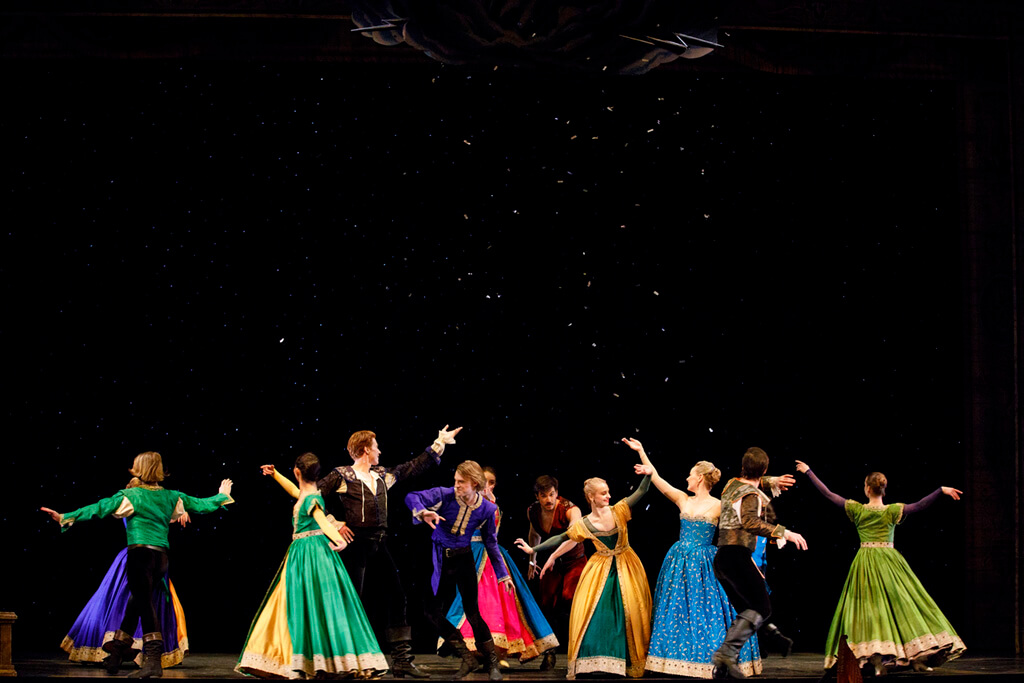
So we begin ten years after the fall of Troy, more or less with the last of the war’s loose ends to play out, namely Ulysses washing up on shore after a vengeful Neptune, played by a commandingly antagonistic Stephen Hegedus, shipwrecks the Phaeacian boat as punishment for their conveyance of Ulysses to Ithica.
In reality, the opera really revolves around Penelope’s principled and unflagging faithfulness to her husband, long presumed dead, in the face of slimeball entreaties from utterly salacious and unprincipled suitors. Her unstinting refusal to acquiesce to the craven courtiers and other usurious hangers-on who want her land, titles and kingdom was likely yet another audience pleaser in its day. While Italians wanted true love withstanding all in the face of impossible odds, they preferred sanitized versions of their classical myths with just the right amounts of love, scandal and gore — not too much, never too little. The suitors get their just desserts in the end.
In effect, Italian nobility and opera-goers weren’t too hung up on history and never let it get in the way of a good emergent story. Much like the Greeks two thousand years before them, they cared about a simple premise that would make them cry at all the right points, especially at the end. The archetype of Penelope waiting at her loom (not shown in this production) furnished those virtues in abundance and served more as a dramatic excuse than adherence to literature. Instead of being called The Return of Ulysses, the opera ought to have been called The Virtue of Penelope.
In every way, Mireille Lebel was the Penelope Monteverdi would have wanted. Delicate, firm of resolve, unflagging in her belief that she will not be fooled into believing Ulysses was still alive, even when he stands before her at the end of the opera, she is nevertheless sagacious in her courtly demeanour especially when she hands the bow to a disguised Ulysses, under command from Minerva to play the part of beggar. Penelope wisely proclaims that even a man in rags can possess strength too — one of many fine acting moments from Lebel. And her singing from first note to last made me believe she was an eternally sorrowful Penelope, deceived a hundred times by imitators and charlatans that her husband was still alive.
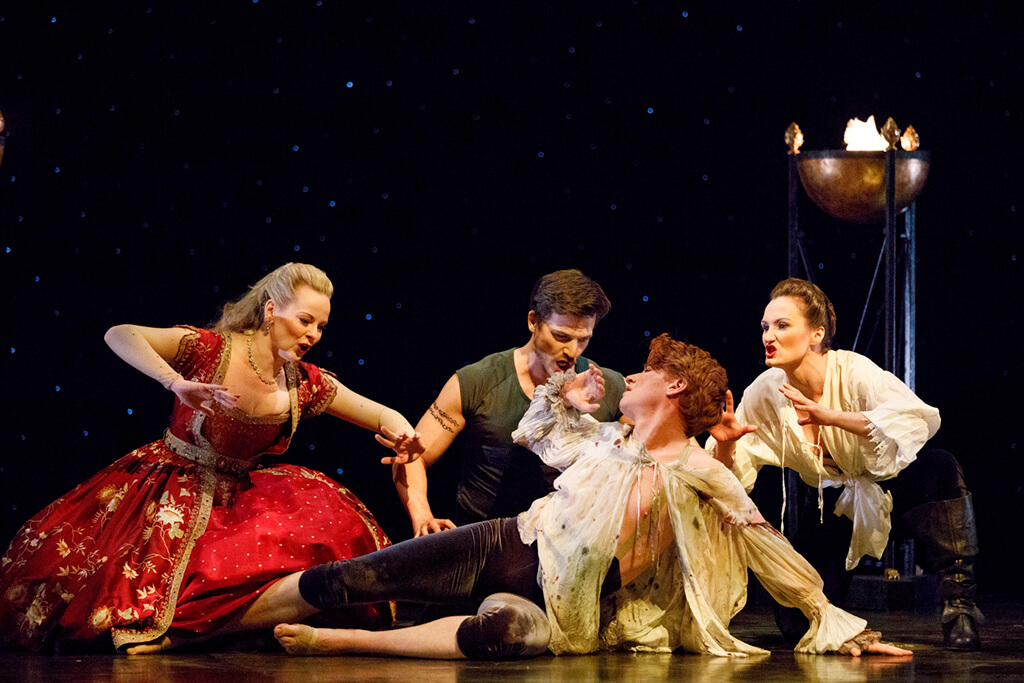
And here is where the difficulties begin. If you go to Ulisse to see Homer, you’ll be sadly disappointed. However, if you go to see a classic morality tale with exquisite music, daring harmonies, unerringly fine singing and resplendent dance of the finest performative calibre, then you’re in for a good, if slightly long night at the Elgin Theatre where you’ll come away with more than your money’s worth of early opera entertainment.
One of the most entertaining roles to watch is Douglas Williams’ he-man Antinoo, who does everything to invade Penelope’s life with nauseating repulsiveness. He was disgusting and beautiful at the same time, a wonderful musical-dramatic achievement, especially when he fails to string the bow and realizes that it can only be done with the semi-divine strength of Ulysses.
Christopher Enns gives us a sympathetic Telemaco, and Aaron Sheehan is a sweet Eumete (no longer the swineherd Eumaeus in the original Homeric epic). He is also the perfect steward in Act II and general nice-guy go-between, nimble of voice and secure in his characterization. He holds the stage conspicuously well and we all want to see him in more roles soon. Isaiah Bell is a craven Eurimaco, led by the lustful Melanto played convincingly by Carla Huhtanen. Meghan Lindsay sang a powerful goddess Minerva.
Kudos goes to lighting designer Michelle Ramsay’s perfectly measured lightning chaos when the suitors are slain, an ideal complement to the Artists of the Atelier Ballet leaping appropriately to their pierced deaths, courtesy of the usual consummate choreography provided by Jeanette Lajeunesse Zingg. And speaking of dance (and I love to), I enjoyed the concluding moresca and the two-step passamezzo moderno near the beginning of Act II for the women, with authentic castanets and bells, a sign of Spain’s cultural invasion of the Italian courts during that time. The men performed a dazzling compound duple Saltarello to follow. The more dance, the better.
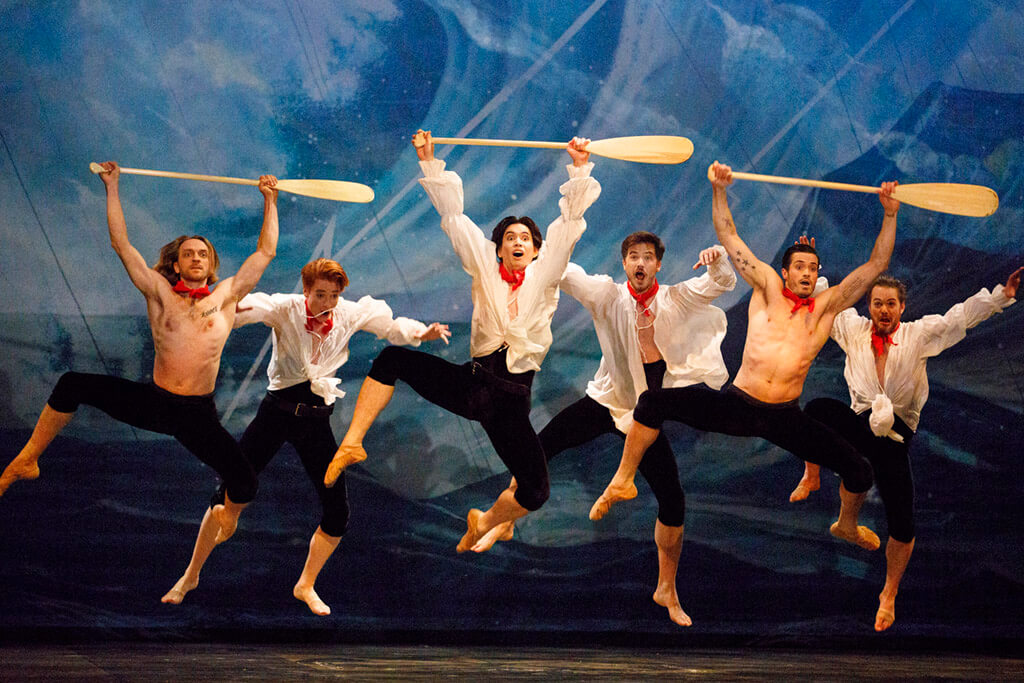
Monteverdi’s retelling of Homer runs mostly, if not entirely, on the composer’s considerably adventurous score. It appears that Monteverdi took control of the libretto, apparently to flex some creative license as to when and how he could write musically sensuous duets, multiple rising chromatic lines to isolate emotional moments of considerable intensity and to switch moods and affects on a dime. These techniques were mostly a holdover from his turn-of-the-century madrigal-writing days and his consummate mastery of them worked well. Monteverdi’s Ulisse was at times conservative but very often highly forward-looking too, and that demanded sensitive musical readings which the entire cast and orchestra delivered with aplomb.
But, in spite of the production’s many gems and director Marshall Pynkoski’s tautly hewn labours that stuck conspicuously closely to the score and the modified libretto’s intentions, the broader narrative problems with Monteverdi’s work don’t really evaporate.
The bow-stringing scene was one such example. Considered the first apex of the opera’s dramatic arc, the scene is hard to pull off. Here, Ulysses seemed positively unheroic, not due to Pynkoski’s direction, but due to the dialogues aside and ariosos he is assigned. A mere pawn of Minerva’s power, and least of all a mighty warrior and skilled sailor, this Ulysses owes his homecoming to divine intervention and is less an agent of his own action and more beneficiary of a dea ex machina pulling his strings — certainly not what the epic poem intended. The scene falls dramatically flat in contrast to what it could be: the return of a hero who ought to bring the “oh no” moment that confronts the crass courtiers with their own mortality — surely vengeance is at hand, but where is the musical power of that quintessentially dramatic moment? And let’s not even mention that this “hero” is meant to shoot an arrow through twelve axe-heads to win the favour of Penelope. Love, in this context, surely is meant to be far more noble.
Vocally, however, Monteverdi assigns Ulysses a powerful diversity of emotions to navigate throughout the entire opera. Krešimir Špicer has the ideal timbre and the requisite vocal security to match at all registers of the extreme ranges we find in Monteverdian heroic roles. Špicer rainbowed a lovely midrange, purveyed an emotional lower baritone and a ringing tenor in his upper extension. His is a natural voice for the role, and he understood its emotional nuances well — a master of early operatic, melodic art.
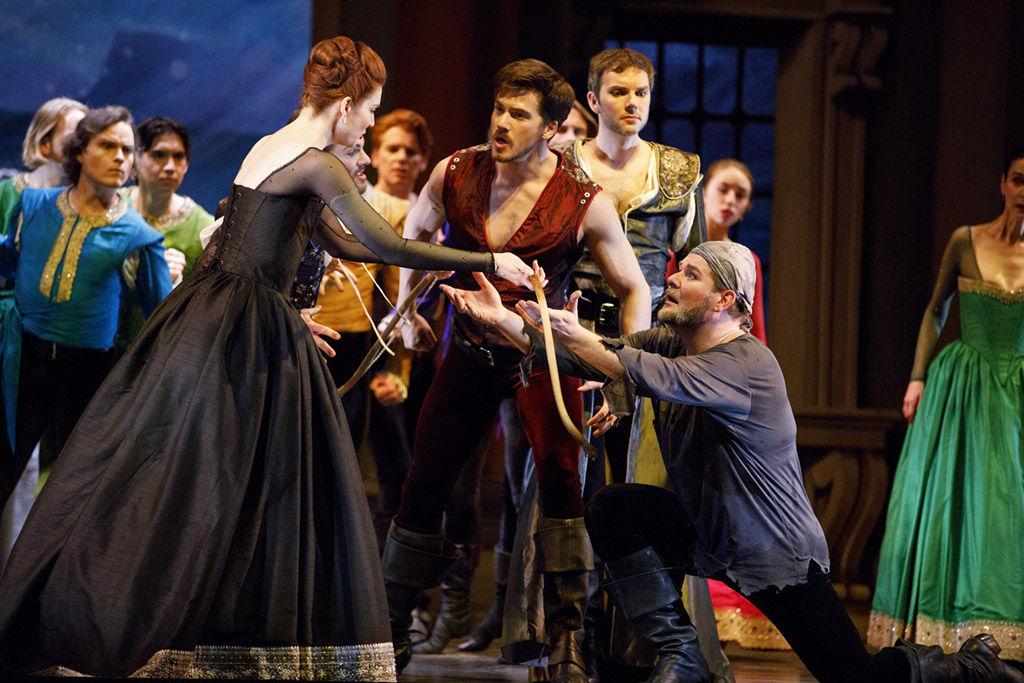
The opera’s second apex is Penelope’s recognition of her husband. At long last, she realizes who he is in the face of overwhelming evidence, but only when he describes a detail of her private bedroom that she would recognize as something only her husband could know. It is a lovely moment, musically exquisite even as a suitable end to the opera, a prototype to the Nero/Poppea duet that would close Monteverdi’s last work a few years later.
Yet none of it is dramatically satisfying somehow to rescue it from anti-climax. It is merely …. sweet sounding. I strongly identify with the opera’s music, and I find Pynkoski’s directorial solutions eminently practical and appealing to a contemporary audience, but the work’s naturally embedded mythopoetic impact is lacking and often void. I’m going again on Saturday, but mainly for the music, David Fallis’s unerring conducting plus gorgeous lute/harp/harpsichord continuo, the dancing and the fine singing.
In the end, opera can very often be about just those things, and there is no doubt that Ulisse, for all its dramatic issues, works modestly well as a simple story about love, disguise, and fidelity.
And in this way Opera Atelier has strung a stiff bow indeed and overcome the odds to accurately hit its mark.
Update: April 23, 9:20 a.m. A previous version incorrectly stated Douglas Williams was playing Eurimaco, when he was playing the role of Antinoo.
- SCRUTINY | Opera Atelier’s Film Of Handel’s ‘The Resurrection’ A Stylish And Dramatic Triumph - May 28, 2021
- HOT TAKE | James Ehnes And Stewart Goodyear Set The Virtual Standard For Beethoven 250 - December 15, 2020
- SCRUTINY | Against the Grain’s ‘Messiah/Complex’ Finds A Radical Strength - December 14, 2020



